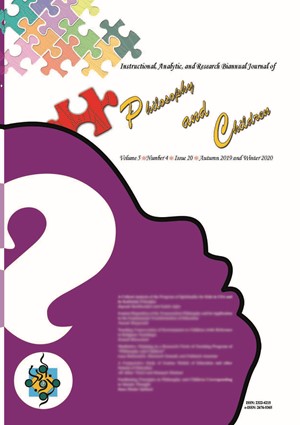The Impact of Philosophical Thinking on the Questioning Spirit of Students: a Qurānīc Approach
Subject Areas : «تعلیم و تربیت» و «فلسفه و کودک»Roya Abdolahpour Abdolahpour 1 *
1 -
Keywords: philosophical thinking questioning student the Qurān,
Abstract :
The present work deals with the impact of philosophical thinking on the questioning spirit of students from the perspective of the Qurān based on certain documents and analysis. According to the findings of the researchers, based on the Qurānīc verses we can find five fields for raising questions: whom questions, what question, how question, the way of questioning and question about what. The Qurānīc responses are as follows: 1. raising question from the knowers, thinkers, and experts is permissible, 2. everything can be called into question, e. g. expending, alms, mountain, crescent, resurrection, spirit, and so on, 3. Question should be logical, sound, intelligible, and not for showing but for knowing. 4. For example, question should be about the way of expending, the way of treating the orphans, the homeless, and the way of happening of resurrection. 5. Question about ourselves, God, others, nature which are among the most original human questions. Out of these the fifth question turns out to be the most important one in the development of education and the national curriculum of students. This kind of raising question paves the way for the intellectual, and scientific development of students. It is to be pointed out that by highlighting this question it does not mean that other questions are not important.
قرآن كريم. .
پروینیان، مژگان و همکاران (1395) طرح بحث برای مدیریت کلاس فلسفه وکودک، تهران: بنیاد حکمت اسلامي صدرا.
حبیبی، نجفقلی (1388) «در حاشیة فلسفه برای کودکان»، مجلة فرهنگ، شمارة69، ص340-331.
شاهآبادی و همکاران (1395) «تأثیر پرسشگری بر مهارت دانشآموزان، فصلنامة خانواده و پژوهش، شمارة32، ص 46-33.
شمشادی، خدیجه (1385) «پرسشگر و فلسفه»، حکمت سینوی، شمارة23، ص32-11.
فیاض، ایراندخت (1388) «پرسشگری راهبرد هویت پایدار دینی در قرآن کریم»، فصلنامه تعلیم وتربیت، شمارة 66، ص98-37.
محمدی پویابیجنوند، فرامرز؛ صالحی، اکبر (1393) «تحليل محتواي قرآن كريم بر اساس مفهوم تفكر انتقادي»، علوم تربیتی از دیدگاه اسلام، شمارة 3، ص50-25.
منصورنژاد، محمد (1385) مطهري و پرسشگري؛ دغدغههاي جوان پويا. تهران: جوان پويا.
نیازی، شهریار؛ گودرزی، طاهره (1396) «پرسشگری خداوند در قرآن کریم، مطالعۀ موردی: سورة یس»، فصلنامه آموزههای قرآنی، شمارة25، ص232-211.
Beck, R. & Jessup, R. K. (2004). The Multidimensional Nature of Quest Motivation. Journal of Psychology and Theology. Vol. 32. No4. pp.283-294.
Doolan M. A. & Gilbert T. (2017) Student Choice: Blends of Technology beyond the University to Support Social Interaction and Social Participation in Learning. In G. Vincenti, A. Bucciero, M. Helfert and M. Glowatz eds. E-Learning, E-Education, and Online Training. Cham Springer.
Haynes, j. & Murris, K. (2011). The Provocation of an Epistemological Shift in Teacher Education through Philosophy with Children. Journal of Philosophy of Education, Vol. 45, No. 2.
Lyle, Sue (2008). Dialogic Teaching: Discussing Theoretical Contexts and Reviewing Evidence from Classroom Practice. Language and Education, vol. 22: No.3, pp. 222 – 240.
Lizzie, L & Chris, R. (2002) Issues arising in the use of philosophical enquiry with children to Develop Thinking Skills, Education 3-13. International Journal of Primary, Elementary and Early Years Education. vol. 30. No.2, pp.52-55.
Topping, K .J and Trickey (2007) Collaborative Philosophical Enquiry for School Children: Cognitive Effects at 10–12 Year.
Topping, K.J. Trickey, S. (2014). The Role of Dialog in Philosophy for Children. International Journal of Educational Research, No. 63. pp. 69-78.

